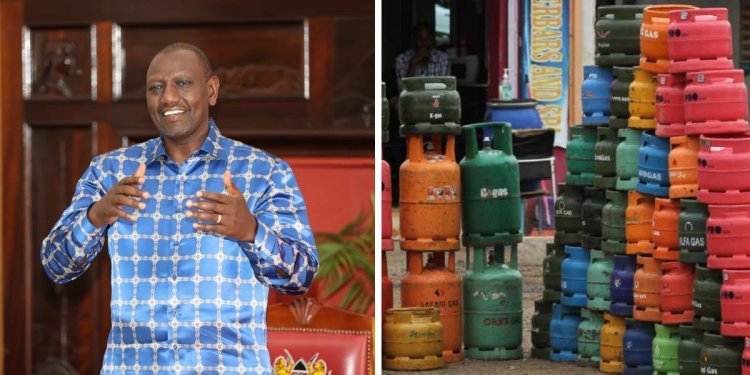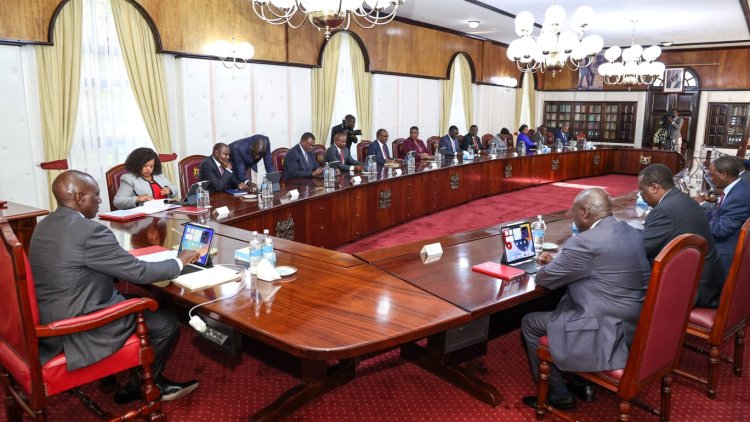Ruto's Promise To Lower Cost Of Cooking Gas Closer To Reality
President Ruto indicated that the removal of the tax on gas would allow Kenyans to buy more gas.

President William Ruto's promise to lower the cost of cooking gas by June could be realised if a proposal made during his Cabinet meeting on Thursday, April 27 is anything to go by.
In the latest Cabinet despatch sent to newsrooms, the government is proposing exempting Liquefied Petroleum Gas (LPG) from Value Added Tax (VAT), as Ruto had promised on Thursday, March 2.
The special Cabinet meeting was for the purpose of considering the Administration’s inaugural budget 2023/2024 financial year in compliance with the Constitutional and statutory timelines as set out in the law. The apex body considered and approved the annual budget for transmittal to Parliament.
The strategy of scrapping VAT from LPG gas would be achieved through the Bottom-Up Economic Transformation Budget for the Financial Year of 2023/2024.

President William Ruto chairing a Cabinet meeting on April 27, 2023. /STATE HOUSE KENYA
"To reduce the cost of liquefied petroleum gas (LPG) and make it affordable, reduce the use of biomass fuel and destruction of our forests, the Bill proposes to exempt LPG from VAT. It further proposes to exempt LPG from Railway Development Levy (RDL) and Import Declaration Fees (IDF)," the despatch read in part.
The Cabinet also highlighted measures in a bid to reduce the cost of living which would cover the tea industry.
"In order to promote local processing of tea and value addition for export, the Bill proposes to exempt from VAT, tea purchased from factories or the auction centre for the purposes of export. In addition, there is a deliberate assessment of tax incentives required for the domestic capacity of packaging materials to support value-addition for the tea export Industry," added the despatch.
The Finance Bill 2023 also revealed that the government has taken a value chain approach to budgeting and has committed a total of Ksh267.7 billion in nine value chains which will mainstream the Bottom-up transformation agenda.
The value chains include:
- Cotton to Textile and Apparel value chain.
- Edible Oil crop production value chain
- Dairy value chain
- Leather & Leather products value chain
- Rice production value chain
- Tea value chain
- Blue Economy & Fisheries value chain
- Minerals and Tree Planting value chain
- Construction & Building material value chain
However, the Bill proposed an increase in tax on imported fish by introducing an excise duty on imported fish and Imported furniture to support the local industries and expand the tax base.
Speaking during the launch of the Women Enterprise Fund and the second product of the Hustler Fund at KICC, Nairobi on Thursday, March 2, President Ruto indicated that the removal of the tax on gas would allow Kenyans to buy more gas.
"I have stated that from the month of June, we will put plans in place to ensure that women use clean energy. The first thing that we will do is remove the tax on gas. That eight per cent the government takes will be removed to allow more Kenyans to have gas.
"Today, Kenyans are buying gas at Ksh2,800 and we are saying that we shall put government money in the sector. The 6kg will be Ksh500 or Ksh300," he said.
Ruto also revealed plans to scrap the use of wood fuel domestically, warning of the health risks that come with using firewood, which produces smoke.
"We want to prevent all those health issues that are a result of smoke that come because of using wood as fuel. We want our women to use clean energy to cook," he stated on Sunday, February 26 during a church service at Muungano grounds in Mpeketoni, Lamu County.






